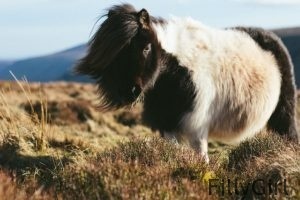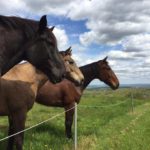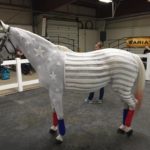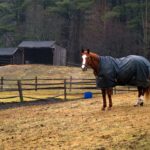There’s one question we keep seeing pop up over and over again… “should I clip my horse’s hair in the winter?” Now if you ask that question to three different equestrians, you will probably get three different answers, and rightfully so. Why? Because it really does depend on your particular situation. The factors to consider when deciding whether to clip your horses hair in the winter include the following: the climate (temperature and rain/snow fall) in your area, how much your horse gets “turned out” in the winter, if your horse lives outside or is stabled, whether or not your stables are heated, how much you will be riding and exercising your horse, and whether or not your horse will be competing/showing.
Regardless of whether or not you clip your horse’s hair in the winter, you will definitely need at least two horse blankets or horse rugs (for those of you in the U.K.). You will need at least two horse blankets
so you can rotate them during the wash cycle and also to be able to adjust your horse’s level of comfort with varying degrees of outside temperatures (i.e. in the beginning of the winter versus the middle, when it’s coldest). Additionally, if you live in a cold winter climate, you will need a horse blanket whether your horse is clipped out or not because in some areas, for some breeds (i.e. thoroughbreds) it’s just too cold for them, even when they have all their hair. But back to the decision of whether or not to clip your horses hair in the first place. Since most horses will require some sort of rug in the winter, even if it’s only a light one, the debate isn’t whether to let your horse’s hair grow out or use a blanket/rug. Rather, the whole thing really boils down to one question- how much will your horse be sweating over the winter? With long and perhaps “woolly” hair, your horse will sweat more when exercised, and will take longer to dry off. That, in turn, could lead to them developing a “chill.” Thus, it’s important to estimate how much you will be riding during the winter, including recreational and competitive. If you intend to compete or show, the decision to clip your horse’s hair becomes a bit more straightforward. For purposes of appearance and tradition, in addition to the extra exercise, you should almost definitively clip them out.
The benefit of not clipping out your horses hair in the winter is fairly obvious. When left to grow out,  or when living in the wild, horses will grow long, thick protective coats during the winter to help keep them warm. Horse physiology differs from humans in that a horse’s body is designed to generate and store heat, whereas a human body is designed to regulate core temperatures. In addition, long, thick hair will develop and retain more natural oils which are not only “good” for the hair’s condition, but also act as a natural repellent against rain and snow. So if your horse will not be getting a lot of exercise, and will be kept outside of the stables for most of the winter, it may make sense to just let your horse’s hair grow out “au naturale.”
or when living in the wild, horses will grow long, thick protective coats during the winter to help keep them warm. Horse physiology differs from humans in that a horse’s body is designed to generate and store heat, whereas a human body is designed to regulate core temperatures. In addition, long, thick hair will develop and retain more natural oils which are not only “good” for the hair’s condition, but also act as a natural repellent against rain and snow. So if your horse will not be getting a lot of exercise, and will be kept outside of the stables for most of the winter, it may make sense to just let your horse’s hair grow out “au naturale.”
If you decide to clip out your horses hair this winter, there are a couple of different types of “standard” clips available. A “bib” clip removes the hair from the underside of the neck down in front of the chest, while a “hunter” clip takes off all the hair, except for a small area of mane, the saddle area, and all four legs. If you decide to do the clipping yourself, be sure to take precautions and read our post “A woman was killed clipping a horse- Reminder!” And for a great “horse hair joke” check out our post “I Left It In Too Long”. You will also need a good pair of horse clippers . As for horse blankets and rugs, they have about as many different varieties and styles as human coats and jackets these days! I think I’ve even seen the boots to match 🙂









I’ve been using Wahl horse clippers and haven’t had any problems. No matter which brand you use, you need to use spray oil since the blades get so hot.
I agree with your comment and other Filly Girl article on being safety conscious when clipping. Even the most calm horses can be spooked with the noise or heat of the clippers. Always wear a helmet when clipping as an added precaution.
On another note, does anyone have a preference on the brand of horse clippers?